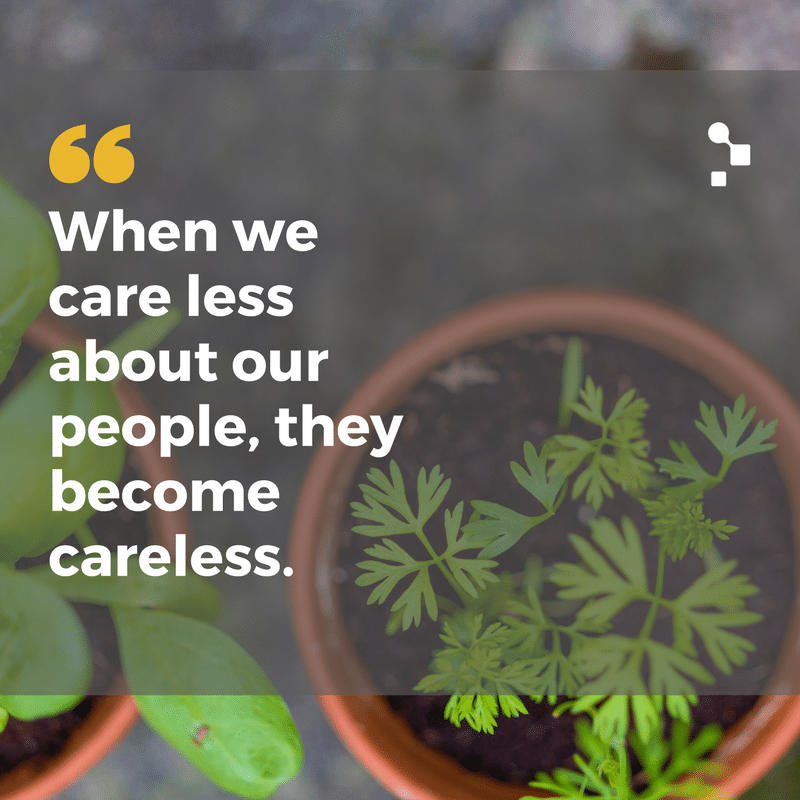Our Chief People Officer, Vera Babat, explains what it means to consider employee happiness and the role of “People Care”
I must confess that the role, “People Care,” at first seemed a bit like smoke and mirrors to me. Caring for people? Making sure people are being taken care of? The concept seemed too vague. But, it’s increasingly clear to me the importance for more and more companies to incorporate an employee happiness-centric role in their organizational charts.
The word caring is at the center of what I do today, which is why I like this play on words:
As a mom, of course, I know that caring is very important. As an elementary school teacher and a high school teacher as well. As a clinical psychologist, it’s fundamental. But I never imagined that capturing the role of “caring” was even possible in a corporate setting. It’s not traditionally included in the description of the role of psychologists in organizations. At least it was not for me. It wasn’t what I thought of when I heard the term “Human Resources.”
In HR, we deal with the various team mechanics that exist within a company. Teams are formed by a task. Through spending time together, team members get to know each other and value each other’s presence. And, this does not happen magically. However, many times we let people fend for themselves and when they start a new assignment, they feel like they were “sent to war with just a toothpick.”
Failing to properly onboard and prepare employees for their roles happens even in organizations with the best of intentions. And, the responsibility for caring can’t fall on just a couple of professionals. To gain visibility on this issue, at Abstracta, we held a workshop on “caring” for new people in teams. We call this initiative “nexus” because it’s precisely this team of people that will operate as the link in the new person’s integration process and the different areas they pass through in the company.
Recently we carried out a workshop to train and raise awareness about onboarding strategies and commonly held misconceptions. To do so, we left the city and performed several activities that revolved around how to take care of others.
One activity that I’d like to mention in particular, is in which the center of the action was not people, but the act of caring. In this case, we discussed how to properly take care of a lettuce seedling.
Because, what do we expect to happen when caring for adults, in all their complexity, if we cannot even take care of a small plant?
As a gardener and fervent admirer of Mother Nature, here I would like to share some of the lessons we arrived at that day; lessons that we learned contemplating nature’s timing and processes. Lessons that apply to the garden but also work as a rich metaphor for our onboarding process at Abstracta:
- Think before making decisions. Evaluate and inform yourself. Know the needs of the plant and evaluate how it will interact with the rest of the garden.
- Put your hand on the ground. Commit yourself to the task.
- Choose the right terrain. Make sure the seedling is in a space a little larger than itself, making sure it will have room to grow.
- Make sure that wherever you plant, you have the right conditions: fertile land, good drainage, etc.
- Care with lots of water at the beginning and tighten up the soil around it to help it develop its roots quickly.
- For deep roots, water abundantly once every two days. If it is only watered a little each day, it will grow rapidly but have very shallow roots and little strength.
- Watch out for strong sun. Protect it when necessary.
- If it starts to wilt at any time, make sure that the sun and other conditions in which it grows are as they should be, add extra fertilizer, and set up a stake to guide its growth. Careful with excess water- as it spoils the roots.
- Clean the earth around the plant. Take care of any nearby weeds that may take away its strength.
- Re-evaluate periodically if it’s in the right place. Consider its growth rate. Make sure that the pot or soil contains the seedling but does not smother it while allowing plenty of room to grow.
Looking at these steps, we realized that they match the care we value when someone joins a team inside Abstracta. Moved by this, together we generated a guide of good practices to make our company an even better place to work.
And, we even brought back a seedling to take care of in the office!
How does your company onboard and take care of its employees to make sure they grow and are right where they should be? Or have you considered giving a care package? (If so, did you put in it anything similar to these packages?)
It never hurts to pamper your employees. After all, they are the people you spend most of your time with. And also, they are the ones who help you with the success of your company.
Recommended for You
Creating Testers Through Four Different Education Strategies
Uruguay: The Best Hub of Software QA Engineers in Latin America?
Vera Babat
Related Posts
How a Band of Tech Companies is Helping to Face COVID-19 in Uruguay
Chatbots and a telemedicine app are some of the tools the local tech community is providing to help the Uruguayan government care for its citizens For almost every country in the world, the arrival of the COVID-19 has posed a tremendously large challenge to create…
#ScrumFEM is changing the lives of 10 women in Uruguay
Some are mothers and unemployed. Others are also the main breadwinners in their households. They live in different situations but have something in common: their desire to develop combined with the lack of resources to make it possible. 9 of them are now internationally certified…









